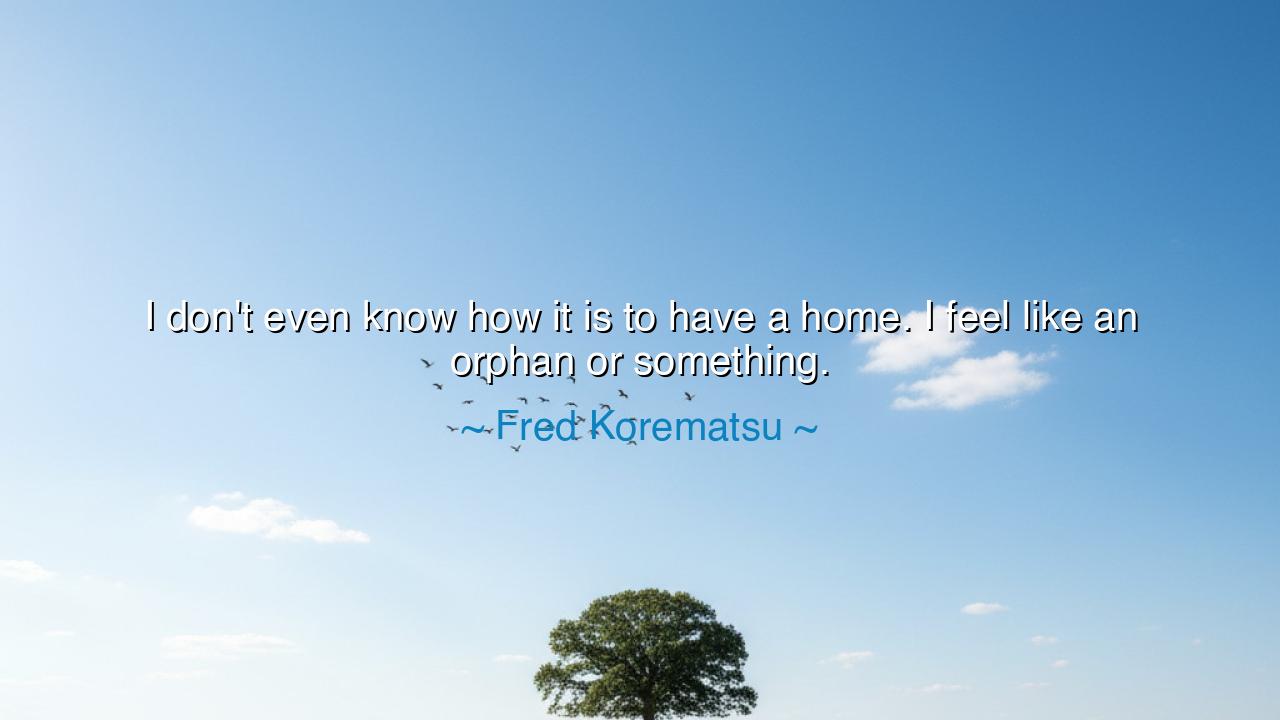
I don't even know how it is to have a home. I feel like an orphan






When Fred Korematsu said, “I don’t even know how it is to have a home. I feel like an orphan or something,” he spoke from the deep sorrow of one who had seen the very idea of belonging torn away. His words are not merely about a house or a place, but about displacement of the soul — the anguish of being denied one’s right to exist freely within one’s own land. They echo the cry of the exiled and the oppressed throughout history, those who have been made strangers not by distance, but by injustice. Beneath his quiet tone lies the pain of a man whose loyalty was questioned, whose dignity was stripped, and whose only “crime” was being born into a heritage deemed unworthy by fear.
To understand these words, one must remember the world from which they came. Fred Korematsu, a Japanese American, was a young man living in California during the dark years of World War II, when his country — the land of his birth — turned upon him and his people. After the attack on Pearl Harbor, the United States government ordered the forced internment of Japanese Americans, accusing them collectively of disloyalty. Over 120,000 men, women, and children were uprooted from their homes, their businesses, their lives, and placed in barbed-wire camps scattered across desolate lands. Korematsu refused. He chose not to go. For this, he was arrested and condemned — not as a criminal of deed, but as a criminal of identity.
When he said he felt like an orphan, his words revealed more than loneliness. They revealed what happens when a nation abandons its own children. A home, in the truest sense, is not only a roof and four walls; it is a space of safety, of belonging, of recognition. To be exiled in one’s own country is to suffer a wound deeper than physical separation — it is the loss of trust, the breaking of the sacred bond between individual and homeland. In that moment, Korematsu was not merely homeless; he was spiritually cast out, denied the embrace of the land he called his own.
The ancients knew the pain of exile well. Ovid, the Roman poet, banished from his beloved Rome, wrote in his despair that though his body lived, his heart had been sent to die in foreign soil. His sorrow mirrors Korematsu’s: both were punished not for what they had done, but for what others chose to see in them. And yet, from that exile came clarity — the realization that home is not granted by governments or walls, but by justice, and by the courage to claim one’s place in the world even when the world rejects you.
Korematsu’s courage did not end with his imprisonment. Decades later, he challenged the United States government in one of the most important civil rights cases in history: Korematsu v. United States (1944). Though the Supreme Court upheld his conviction at the time, his resistance became a seed of righteousness that would grow in the hearts of future generations. In 1983, his conviction was finally overturned, and his name was restored. Yet the pain that shaped his words — the feeling of being an orphan of one’s own country — remained, for no apology can return what was lost: the innocence of belonging, the trust of home.
His lament teaches us that home is not merely a place, but a promise — a covenant between people and their society. When that covenant is broken by prejudice, home becomes exile, and citizens become wanderers in their own land. The tragedy of Korematsu’s words is not his isolation, but the nation’s failure to live up to its ideals. Yet within that tragedy lies the seed of wisdom: that true belonging must be built not upon fear or conformity, but upon equality, respect, and compassion.
And so, O seeker of truth, take this lesson to heart: never let another be made an orphan by injustice. Defend the right of every soul to feel at home in their own skin, their own land, their own truth. When you see prejudice arise, remember Korematsu’s pain — the orphaned heart yearning for a home that turned its face away. Let his courage be your compass, his endurance your call to action. For a nation’s greatness is not measured by its wealth or its wars, but by its ability to make all who dwell within it feel they belong.
Thus, the wisdom of Fred Korematsu endures: that home, in its truest form, is not a place we are given — it is a truth we create. It is built upon justice, defended by empathy, and sustained by courage. When we honor that truth, we ensure that no one shall ever again say, “I feel like an orphan or something,” in the land that was meant to be their home.






AAdministratorAdministrator
Welcome, honored guests. Please leave a comment, we will respond soon